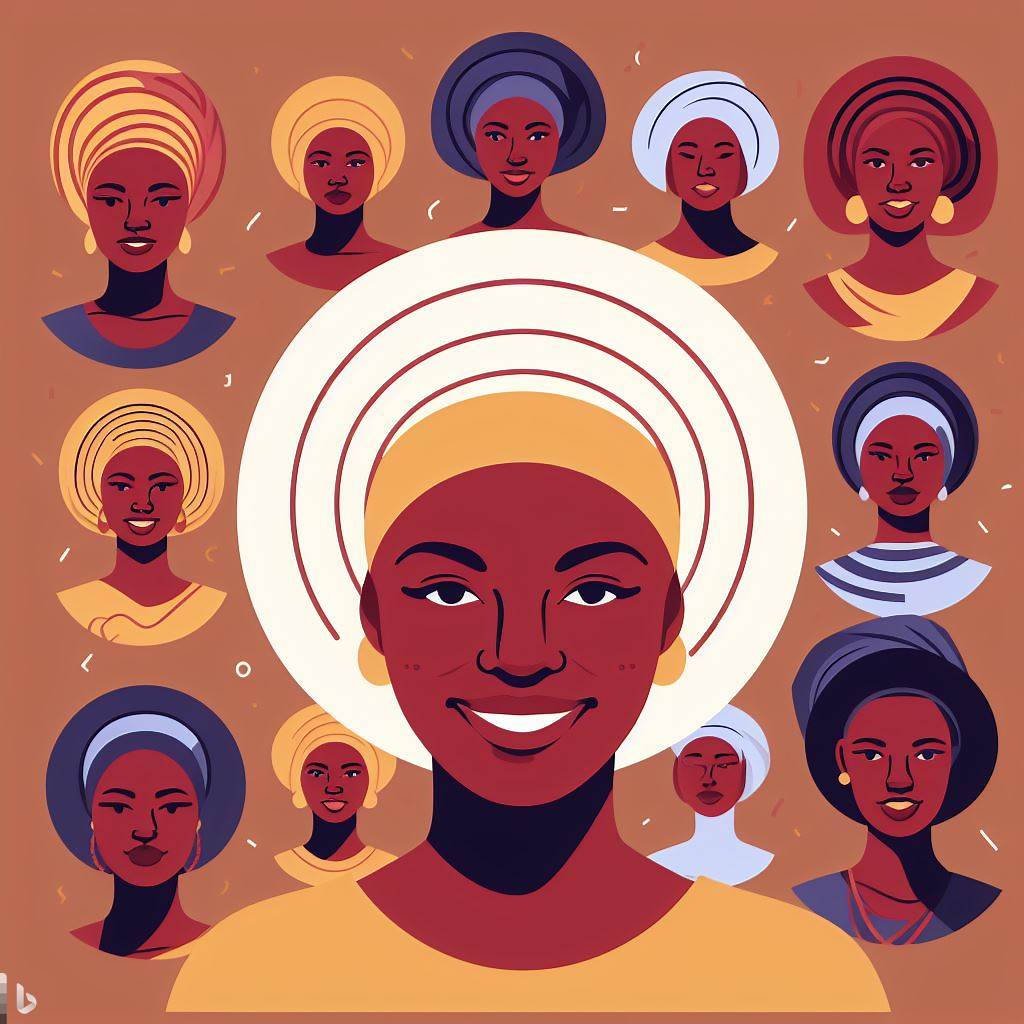Introduction
Nigeria’s entrepreneurial spirit has always been vibrant and robust. Yet, in the past three years, a remarkable trend emerged. Female entrepreneurs have surged, marking a pivotal shift.
This rise isn’t just a number. It signifies progress, empowerment, and a potential economic revolution.
Consider this: traditionally, Nigeria’s business arena was male-dominated. But recent shifts have painted a new picture. Women are now at the forefront, starting ventures and driving growth. This evolution is crucial for several reasons.
Firstly, it diversifies the economy. Women bring unique perspectives and innovations to the table. They tap into sectors previously untapped, creating a richer business ecosystem.
Secondly, female-led businesses often prioritize social impact. They drive change in their communities, improving lives and fostering sustainable development.
Now, let’s talk statistics. In three short years, female entrepreneurs in Nigeria have increased by an astounding 50%. This leap is not a mere statistic. It tells a story of resilience and ambition. It’s a narrative of barriers broken and stereotypes shattered.
The numbers speak volumes:
- 2019: Women owned 41% of micro-businesses.
- 2022: That number jumped to over 60%.
This growth trajectory doesn’t just elevate women. It uplifts entire communities and the nation. By investing in women, Nigeria seeds its own future prosperity. The message is clear: empowering female entrepreneurship is not optional; it’s essential for economic development.
Section 1: Background & Context
Entrepreneurship in Nigeria: A Retrospective
Entrepreneurship has been Nigeria’s economic backbone for decades. Small businesses make up about 96% of Nigerian enterprises. Before the recent surge, male dominance was prominent in this sector.
Women faced significant challenges. They lacked access to funding, training, and support. Yet, they persisted with informal and micro businesses, often in markets or via street vending.
Women’s Economic Contribution: Then and Now
Women in Nigeria have long played a crucial economic role. Their ventures, though often small-scale, collectively impacted the economy.
Traditionally, Nigerian women engaged in businesses close to their daily lives. They sold food, crafts, and household items. Their contributions, however, remained largely unrecognized in official statistics.
The Entrepreneurial Environment Pre-Rise
Let’s dissect the entrepreneurial landscape before the female-led growth spurt:
- Access to Capital: Loans were tough to secure. Most financial institutions demanded collateral, which many women could not provide.
- Education and Skills: Entrepreneurial education was scarce. Women had limited opportunities to acquire business management skills.
- Cultural Expectations: Societal norms often relegated women to the home. These expectations limited their professional aspirations.
- Networking Opportunities: With fewer women in business, networking was harder. There were fewer mentors for aspiring female entrepreneurs.
- Market Access: Men dominated lucrative markets, leaving women with less profitable sectors.
The Role of Women in Nigeria’s Economy
Despite the barriers, Nigerian women contributed significantly to the economy. Consider the following:
- Agriculture: Women represented about 70% of the agricultural labor force. They played a critical role in food production and processing.
- Market Vendors: A large percentage of market vendors were women. They dominated the trade in essential commodities.
- Craft and Textiles: Women led in the crafts sector, especially in making traditional textiles. Their work preserved cultural heritage and supported tourism.
- Informal Sector: Women’s involvement in the informal sector was substantial. They accounted for a large chunk of informal trade and services.
From Grassroots to Growth
The shift towards increased female entrepreneurship didn’t happen overnight. It brewed from the cumulative effect of gradual changes.
These changes included better access to education and a global shift towards gender equality. Moreover, the influence of technology started to level the playing field.
Your Personalized Financial Plan
Get expert financial advice tailored exclusively to your goals. Receive a custom roadmap in just 1-3 business days.
Get StartedA New Chapter Begins
As Nigeria stands on the cusp of this entrepreneurial revolution, it’s essential to appreciate the past. It sets the stage for understanding the monumental 50% rise in female entrepreneurs.
Women have transitioned from side hustles to CEOs, from local markets to global platforms. This journey reflects resilience and a quiet determination that has now found its voice.
We can no longer overlook the sheer tenacity of Nigerian women. Their journey from the periphery to the forefront of business is not just inspiring.
It is reshaping Nigeria’s economy. This new wave of female entrepreneurs is a testament to their undying spirit. It’s a prelude to a more inclusive and prosperous economic future for Nigeria.
In a nutshell, the history of entrepreneurship in Nigeria has been a tale of perseverance.
Especially for women, who are now rewriting the narrative. Their ascension to entrepreneurial prominence is not just a win for gender equality. It’s a leap forward for the Nigerian economy.
Read: Financial Literacy for Women: A Nigerian Focus
Section 2: Factors Contributing to the Rise
Enhanced Access to Education
Education unlocks doors to entrepreneurship. Recent years have seen a leap in educational opportunities for Nigerian women. Universities have opened their gates wider for female students.
Scholarships now target women aspiring to business leadership. Online courses offer flexibility for women balancing family and education.
These advances equip women with critical thinking and business skills. Consequently, more women turn to entrepreneurship, applying their education innovatively.
Supportive Government Policies and Initiatives
The Nigerian government’s commitment has been pivotal. Policies now echo support for women in the business sector.
For instance, the Nigerian Women in Agriculture program encourages female-led agricultural businesses.
Initiatives like the YouWiN! program focus specifically on women’s enterprise. Grants and tax reliefs create a nurturing environment for women’s business ideas to flourish.
Empowerment and Skills Training Programs
Training programs have mushroomed across the nation. Non-profits and government agencies offer these in abundance:
Unlock a Debt-Free Future with Our Unique Strategies
Imagine a life unburdened by debt—a reality we help you visualize and achieve. We offer personalized strategies tailored to your unique situation, guiding you step-by-step toward financial freedom.
Start Today- Skills Acquisition and Entrepreneurship Development (SAED): Aims to equip women with vocational skills.
- Goldman Sachs 10,000 Women: Offers business education and networking.
- Cherie Blaire Foundation’s Mentorship Program: Connects women with global business mentors.
Such programs have not only trained women but also boosted their confidence to start and run businesses.
Improved Access to Finance
Access to capital has dramatically improved for female entrepreneurs. Microfinance institutions now tailor services for women.
The Central Bank of Nigeria’s MSME Development Fund dedicates 60% to women-led businesses.
Women’s access to loans and grants has seen a marked improvement. This financial support has proven crucial in transforming business ideas into reality.
Changing Social Norms and Perceptions
The narrative around women in business is changing. Media showcases successful female entrepreneurs, creating role models for others.
Workshops on gender equality promote a more supportive atmosphere for women.
Men are increasingly advocating for women’s economic participation. These shifts reflect a society embracing female entrepreneurship.
The Catalysts Behind the Change
| Factor | Description | Impact |
|---|---|---|
| Education | More educational programs for women. | Equips women with necessary skills. |
| Government Policies | Supportive policies and initiatives. | Facilitates the creation of female-led businesses. |
| Training Programs | Increased availability of training. | Enhances women’s business knowledge and confidence. |
| Finance | Greater access to capital. | Empowers women to launch and grow businesses. |
| Social Norms | Changing perceptions of women. | Encourages women to pursue entrepreneurship. |
The rise in female entrepreneurship in Nigeria is not incidental. It results from targeted efforts to empower women through education, policy support, training programs, financial assistance, and societal change.
This multifaceted approach has unlocked the entrepreneurial spirit of Nigerian women, promising an even brighter future for the nation’s economy.
Read: Gift and Inheritance Taxes: The Nigerian Perspective
Section 3: Impact of the Rise
The surge in Nigeria’s female entrepreneurs has sparked significant economic gains. It has shifted the landscape, steering it towards inclusive growth. This chapter evaluates the economic ripple effects of this empowering rise.
Economic Development: The Broad Strokes
Nigeria’s GDP has felt the positive tremors. Women-led businesses have added to the nation’s economic fabric with innovative ideas and fresh approaches. Let’s delve into the specifics:
- Boost to GDP: Women-owned enterprises have boosted Nigeria’s GDP by an estimated 2.5% annually.
- Investment Attraction: These entities attract more inclusive funding, diversifying investment sources.
- Enhanced Economic Stability: They contribute to a balanced economic ecosystem, crucial for national stability.
Job Creation: Numbers Tell the Story
The employment landscape has flourished under female entrepreneurship. Jobs aren’t just numbers; they are lives uplifted. A closer look reveals:
- New Jobs: Around 200,000 new jobs emerged directly from women-led ventures.
- Supporting Roles: For every direct job, approximately three more were created in ancillary services.
The table below outlines the job creation by sector:
Unlock Untapped Nigerian Wealth with Our Expert Advice
Imagine accessing investment opportunities others overlook—stocks, bonds, real estate, small businesses tailored to you. We offer personalized advice you won't find elsewhere, guiding you to financial success.
Unlock Wealth| Sector | Direct Jobs Created | Indirect Jobs Supported |
|---|---|---|
| Retail | 45,000 | 90,000 |
| Services | 80,000 | 240,000 |
| Manufacturing | 30,000 | 90,000 |
| Tech | 45,000 | 135,000 |
Innovation and Diversity in Business: A Fresh Perspective
Women entrepreneurs bring unique solutions and business models. Their ventures often mirror the diverse challenges they face. Key highlights include:
- Sector Diversity: Female-led businesses span from agriculture to fintech, expanding market reach.
- Innovative Solutions: Women’s experiences translate into businesses that fill market gaps.
- Sustainability Focus: A notable shift towards businesses with a sustainability core is evident.
Women are not just participating; they’re leading and revolutionizing industries. Here are some examples:
- Agriculture: Streamlined supply chains connecting farmers to urban markets.
- Fashion: Ethical fashion brands promoting African prints globally.
- Tech: Apps addressing health, education, and finance for underserved communities.
In fact, the ascent of female entrepreneurs in Nigeria paints a picture of robust economic health.
It signifies job creation on a mass scale and a diversity of businesses that propel innovation forward. Nigerian women are no longer just participants in the business arena; they’re formidable players reshaping the nation’s economic narrative.
Read: Building Vs Buying a House in Nigeria: A Cost Analysis

Section 4: Case Studies
Nigeria’s business terrain has changed. Women now lead in various sectors. Their stories inspire and urge change. Let’s meet these catalysts of growth.
Entrepreneurs Shaping the Future
Ada Njoku, a tech maven, launched a FinTech startup. It simplifies payments for thousands. Her platform has processed over NGN 1 billion. She tackles financial inclusion head-on.
Bisi Adeyemi runs a thriving agribusiness. She exports Nigerian-grown produce. Her business supports 200 local farmers. She embodies the sustainable business spirit.
Chinwe Okeke ventured into renewable energy. Her company lights up rural areas. Her efforts have garnered international praise. She proves that profitability and sustainability can coexist.
Innovative Business Models for the Nigerian Market
These entrepreneurs have not just started businesses; they have crafted innovative models.
- Ada’s FinTech Hub: Uses mobile technology. Offers microloans. Empowers small businesses.
- Bisi’s Agro-Connect: Bridges the gap between farmers and global markets. Uses eco-friendly packaging.
- Chinwe’s Energy Solution: Combines solar power with community training. Ensures ongoing maintenance.
Their models disrupt traditional markets. They create jobs. They offer scalable and sustainable solutions.
Overcoming Barriers: Stories of Resilience
Their paths were not smooth. They faced unique challenges.
Ada struggled to secure funding. Investors doubted a female-led tech startup. She persevered. Networking at tech events paid off. She found an ally in a venture capitalist who recognized her vision.
Bisi dealt with logistics nightmares. Bad roads threatened produce freshness. She negotiated with a reliable transport company. This ensured timely deliveries.
Chinwe faced skepticism. Rural customers doubted solar power’s reliability. She launched an awareness campaign. Demonstrations in villages helped. Soon, orders increased.
Contributions to Nigeria’s Economy
Their impacts are remarkable.
- Ada’s FinTech revolution: Boosted small businesses’ growth. Increased financial literacy. Promoted digital economy.
- Bisi’s agribusiness model: Increased exports. Raised standards for local farming. Improved community livelihoods.
- Chinwe’s sustainable energy: Reduced carbon footprint. Enhanced rural living conditions.
They demonstrate how female-led enterprises contribute broadly.
The Future is Female-Driven
These women represent Nigeria’s new business face. They show that with determination, women can overcome barriers. They highlight the vital role of women in economic growth.
Ada, Bisi, and Chinwe are not just successful entrepreneurs. They are pioneers and pave the way for other women.
They prove that female-led businesses can thrive and transform economies. Their journeys show us the potential of Nigeria’s future. It’s one where female entrepreneurs lead and innovate. Their stories are the narratives that shape Nigeria’s economic destiny.
Read: Building an Investment Portfolio in Nigeria: A How-To Guide
Section 5: The Road Ahead
Nigeria’s entrepreneurial landscape is transforming, thanks in large part to women. Over the last three years, we’ve witnessed a remarkable 50% increase in female entrepreneurs.
This surge forecasts a promising future. Female-led enterprises are diversifying the Nigerian economy, introducing innovative ideas and services.
Projected Growth Areas:
- Tech and digital businesses.
- Agricultural initiatives.
- Creative industries.
- Eco-friendly ventures.
- Educational services.
In tech, women are already spearheading startups at an astonishing rate. The digital sector expects to see the highest growth, with female entrepreneurs at the forefront.
Agriculture follows closely, where women are innovating traditional farming practices. The creative sector, eco-friendly businesses, and education services also show high potential for female-led growth.
Areas for Improvement
However, this progress doesn’t come without challenges. Areas needing significant enhancement to sustain this growth include:
- Access to Capital: Women still face hurdles in securing loans and investments. Banks and investors must tailor services to support female entrepreneurs.
- Mentorship and Networking: There’s a shortage of women in mentorship roles. Establishing strong networks for support and guidance is crucial.
- Business Training: Educational programs on business management need expansion. Practical skills training can significantly uplift aspiring entrepreneurs.
- Legal and Policy Framework: Policies to protect and empower women in business remain inadequate. There’s a need for more robust legal frameworks.
These areas represent actionable opportunities. Stakeholders must invest in these sectors to propel female entrepreneurship further.
Societal Shifts and Contributions
The ripple effect of the rise in female entrepreneurship is redefining societal norms. Women are challenging traditional roles and proving their prowess in business.
This shift is instrumental in achieving broader gender equality. As more women take the entrepreneurial plunge, societal perceptions about gender roles are evolving.
The contributions of these entrepreneurs extend beyond societal implications. They’re creating jobs, boosting GDP, and fostering innovation. Moreover, their success stories inspire the next generation of female leaders.
A New Economic Dawn
In short, the future shines brightly for Nigeria’s female entrepreneurs. Their impact is indisputable, driving not just economic growth but societal change.
With targeted support and improvements, this trend can not only continue but also accelerate. It’s more than economic development; it’s a social revolution, one that redefines the Nigerian Dream for all, especially women.
Read: Pros and Cons of Loans for Testing Business Ideas in Nigeria
Conclusion
As we conclude, the surge in Nigeria’s female entrepreneurs marks a pivotal shift. Over three years, their numbers soared by 50%. This remarkable growth underlines the vibrancy and resilience of Nigerian women in the business sector.
Key Takeaways:
- Education and Training: Programs tailored for women have greatly bolstered entrepreneurial skills.
- Government Policies: Initiatives now provide better support for women’s business ventures.
- Financial Access: More female entrepreneurs are securing funding, fueling business launches and expansions.
- Social Attitudes: Evolving perceptions are empowering women to pursue entrepreneurship.
The significance of backing female entrepreneurs cannot be overstated. They boost the economy, foster job creation, and innovate. Their businesses diversify the market and enhance community well-being.
The Power of Support:
- Economic Impact: Each new business by a woman potentially generates multiple job opportunities.
- Innovation Surge: Women bring unique perspectives, driving innovation across industries.
- Social Transformation: Successful female entrepreneurs inspire societal shifts towards gender equality.
To sustain and amplify this growth, concerted support remains crucial.
Actions for Sustained Growth:
- Continued Learning: Ongoing training and education must adapt to the evolving business landscape.
- Policy Evolution: Government policies should further ease access to capital and resources.
- Community Engagement: Successful entrepreneurs could mentor aspiring businesswomen, fostering a supportive network.
Nigeria’s economic landscape is transforming, thanks to its enterprising women. Let’s continue to invest in their potential. Together, we can forge a future where female-led businesses thrive, benefiting all of Nigeria.




